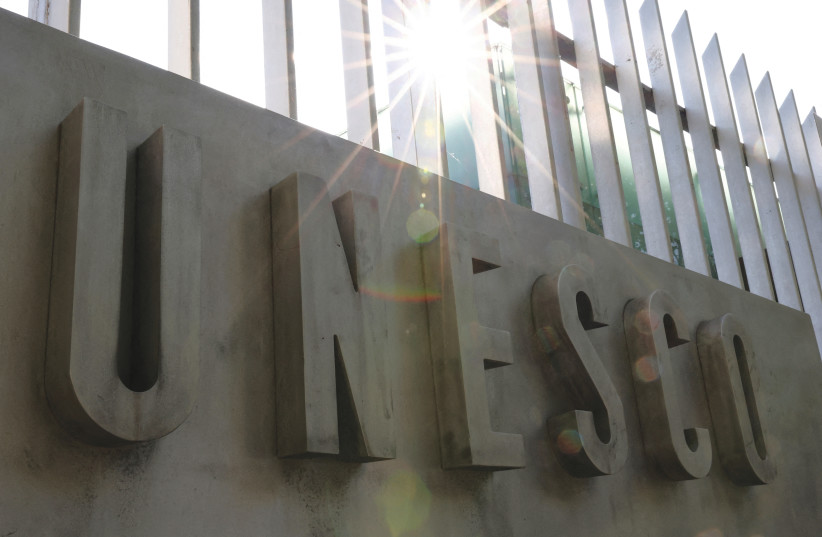Just under two months ago, we cautioned that it was going to happen. On Sunday, it did.
As Jews around the world celebrated Rosh Hashanah, the United Nations Educational, Scientific and Cultural Organization (UNESCO) met in Riyadh, Saudi Arabia, and declared ancient Jericho to be a World Heritage Site.
On the face of it, this is a good thing: Ancient Jericho is indeed a site of great historical importance. Largely regarded as one of the oldest cities in the world, there is evidence of human settlement in Jericho stretching back some 11,000 years. It appears numerous times throughout the Bible and was notably the site of the Israelites’ first battle in their conquest of the Land of Israel, as documented in the Book of Joshua. The city was an important center during the Hasmonean and Herodian periods and the remains of several spectacular synagogues have been uncovered in and around the city.
UNESCO’s inscription omits all that. The carefully worded text that accompanied the site’s designation refers to “vestiges from the Middle Bronze Age” that “reveal the presence of a large Canaanite city-state occupied by a socially complex population.” And that’s where it ends. Absent is any reference to the city’s Jewish history or its centrality to the biblical narrative.
But perhaps the most outrageous part of UNESCO’s designation of the site is its collusion with Palestinian efforts to not only erase the city’s Jewish heritage but claim it as their own, by ascribing it to the “State of Palestine.”

This is not the first time that UNESCO has played along with Palestinian attempts at historical appropriation. Three more West Bank locations have been designated as World Heritage Sites and ascribed to the “State of Palestine” since 2012: ancient Hebron (home to the Tomb of the Patriarchs, one of the most important sites in Judaism), Battir (known in ancient times as Betar, the site of an ancient Jewish village and a consequential battle during the Bar-Kochba Revolt), and the Church of the Nativity in Bethlehem. The Palestinians have signaled their intention to submit additional sites for consideration; those are currently on the Tentative List and include ancient Nablus, Mount Gerizim, and Qumran, among others.
Let us set aside the fact that there is, at present, no State of Palestine: the Palestinian Authority does not meet the basic requirements of statehood, which is why the United States and Israel withdrew from UNESCO after the so-called “state” was admitted to the body in 2011.
Palestinians try to erase Jewish history from the Land of Israel
What is at issue here is the deliberate erasure of the Jewish people’s connections to the cradle of Jewish civilization.
While some of the sites’ official UNESCO descriptions include muted references to their Jewish ties, many do not, in keeping with the Palestinian leadership’s longstanding policy of ignoring, underplaying, denying, or simply erasing the Jewish people’s attachment to this land.
Palestinian Authority President Mahmoud Abbas, whose doctoral dissertation was based on Holocaust denial, is perhaps the most prominent practitioner of this abhorrent policy. He has consistently denied that the Jews have any historical connection to Israel or to their eternal capital, Jerusalem.
“They [Israel] dug under al-Aqsa… they dug everywhere, and they could not find anything,” he told a UN gathering in May. “The ownership of al-Buraq Wall [the Western Wall] and al-Haram al-Sharif [Temple Mount] belongs exclusively and only to the Islamic Waqf alone.”
That Abbas and other Palestinian leaders spew such ahistorical drivel is nothing new; sadly, we have come to expect it. But for a UN body to go along with their distortions of history and their erasure of the Jewish people’s connections to its land brings shame on the UN and on the membership of the body in question.
The United States rejoined UNESCO in July in large part, it said, to serve as a check on the body’s anti-Israel bias. Of UNESCO’s 206 members, the overwhelming majority have diplomatic relations with Israel and some are close allies of the Jewish state.
As Prime Minister Benjamin Netanyahu meets with his counterparts from around the world at the UN this week, he should insist that they stop playing along with the Palestinians’ attempts to erase the Jewish people’s ties to their homeland.
